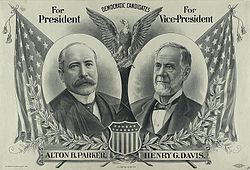Alton B. Parker 1904 presidential campaign
| Alton B. Parker for President | |
|---|---|
 | |
| Campaign | 1904 U.S. presidential election |
| Candidate |
|
| Affiliation | Democratic Party |
| Status | Lost general election |
After
The nomination fight

After his two defeats in 1896 and 1900, former
The Democrats eventually united around
Parker played well to the Democratic Party's white base by refusing to criticize the
While he lacked Bryan's support, newspaper mogul
Campaign
Parker and the Democrats campaigned in favor of reduced federal spending (especially on the military), greater funding to improve national waterways, tariff reform, a thorough investigation of public
Unlike Bryan, who had aggressively campaigned throughout the entire country during the 1896 and 1900 campaigns, Parker ran a front porch campaign from his home in Esopus, New York.[6][5] Parker received a boost when Bryan endorsed Parker after the convention and belatedly campaigned for him in October.[6] Meanwhile, Hill, who managed Parker's campaign, sure of a landslide defeat in November, announced his retirement from politics in order to save Parker from guilt by association with Hill.[6] Throughout the 1904 campaign, the Democrats raised less than $500,000 (equivalent to $17 million in 2023), with more than half of it coming from Virginia tobacco magnate Thomas Fortune Ryan.[6] In the final weeks of the campaign, Parker tried to save his campaign by undertaking a brief speaking tour at the insistence of desperate party leaders, but it was to no avail.[6]
Results
President Roosevelt defeated Parker by a landslide, beating him 336 to 140 in the
In addition, Roosevelt's
References
- ^ a b "HarpWeek | Elections | 1904 Overview". Elections.harpweek.com. 1902-02-19. Retrieved 2017-09-21.
- ^ a b c d e f "HarpWeek | Elections | 1904 Overview". Elections.harpweek.com. 1904-11-08. Retrieved 2017-09-21.
- ^ a b c d e f g h i j k l m n o p q r s t u v w x "HarpWeek | Elections | 1904 Overview". Elections.harpweek.com. 1904-02-23. Retrieved 2017-09-21.
- ^ "Alton Parker | Albany Law School". Albanylaw.edu. Retrieved 2017-09-21.
- ^ a b c d "Historical Society of the New York Courts | New York Legal History / Legal Luminaries : New York State Court of Appeals". Nycourts.gov. Retrieved 2017-09-21.
- ^ a b c d e "HarpWeek | Elections | 1904 Overview". Elections.harpweek.com. Retrieved 2017-09-21.
